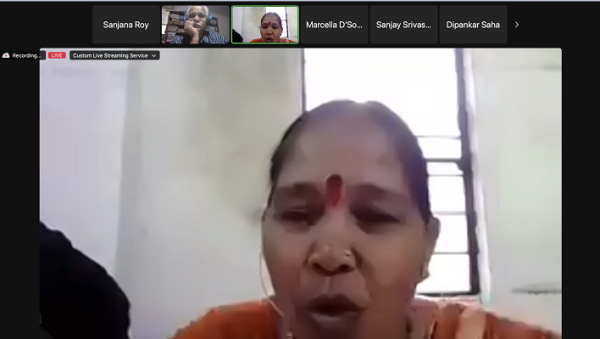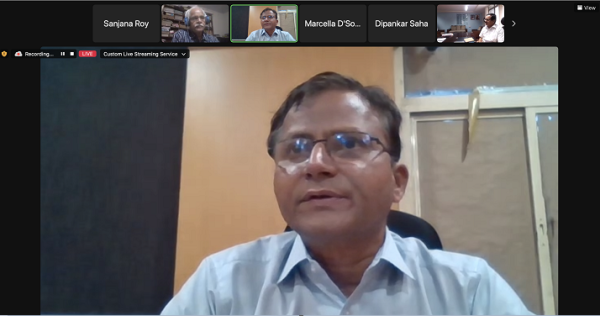Pune - October 19th, 2022 - WOTR (Watershed Organisation Trust) and its research arm, W-CReS (WOTR Centre for Resilience Studies), along with the National Rainfed Area Authority (NRAA) and the collaborative ECOBARI (Ecosystem-based Adaptation for Resilient Incomes) jointly hosted a webinar titled “Farm Ponds for Securing Agriculture in Rainfed Regions: a call for sustainable approaches.” The webinar reflected on research studies and engaged in discussion as to how farm ponds can be managed to promote sustainable and equitable use of our water resources so that all farmers,particularly in rainfed regions of our country, can benefit.
Prominent speakers included Shri Eknath Dawale, Principal Secretary of Agriculture, Government of Maharashtra, Dr. B. Venkateswarlu, Former VC-VN Marathwada Agriculture University, Parbhani, and former Ex.Director ICAR- CRIDA, and Dr. Dipankar Saha, Former Member Secretary, Central Ground Water Authority (CGWA) and Chair Professor, Manav Rachna International Institute of Research and Studies (MRIIRS). The webinar also saw studies being presented by researchers from W-CReS and IHE Delft Institute for Water Education.
Discussions revolved around finding sustainable approaches to securing agriculture using farm ponds, especially as India increasingly faces extreme climate events and a looming ground water crisis. Rainfed agriculture occupies 55% of India’s net sown area, yet securing crops has driven India to be the world’ largest consumer of groundwater.
Key reflections were also shared by Shri Sashi Sekhar, IAS, Former Secretary, Ministry of Jal Shakti, Shri Sunil Kumar, Chairman, Central Groundwater Authority, Shri C.S.R. Murthy, Chief General Manager, NABARD, and Dr. Sanjay Srivastava, Vice Chancellor and Managing Director, Manav Rachna International University.
The general idea behind farm ponds is to harvest surface runoff. However, modifications are made by farmers across peninsular India to achieve year-round water security. In some parts of the country, traditional farm ponds have successfully met community needs for water during the post monsoon season, garnering government support to secure protective irrigation to reduce agricultural losses. Largely varying in size and dimension, most farm ponds today are lined with impermeable material to prevent water seepage. However, this has recently led to worrying trends with many farm ponds becoming surface water storage tanks filled with groundwater that is captured by a few, raising questions around equity, income security, and ecosystem health.
Dr. Dipankar Saha said, “I have seen farm ponds that are so large, bigger than a football field. if they’re not getting enough groundwater, farmers are digging deeper for water. Water sustainability issues are not being addressed properly through these activities.”
Shri Eknath Dawale said, “At the government level, while we do promote farm ponds with linings, subject to the rider that these are not being built at the cost of groundwater.”
Mr. Sashi Shekar reflected on the role of the community saying, “Groundwater management must be handed over to the community. Community must take the responsibility of managing groundwater and such surface runoff so that there is equity in its distribution and usage.”
Dr. Venkateswarlu said, “The rich farmer’s voice is always heard but the farmer who loses is the poor farmer whose voice is not often heard; therefore it is a very sensitive and challenging issue of equity.”
Mr. K.J. Joy, Founding Member and Senior Fellow, SOPPECOM, summed up that “Groundwater is supposed to be a public resource but putting it in farm ponds is privatizing the resource.”
Dr. Marcella D’Souza, Director, W-CReS, in her takeaway, reiterated, “The equity issue needs to be addressed - equity not just in terms of water access for large farmers, small and marginal farmers, and those who need it for drinking, but as an issue about equity for nature, which we may have forgotten, but it needs to be considered because we are all part of nature’s ecosystem.”
This webinar was supported by Honeywell, Manav Rachna International Institute of Research and Studies (MRIIRS), and the National Bank for Agriculture and Rural Development (NABARD). This is the first of a series of events that W-CReS will conduct to engage with key stakeholders and promote dialogue around the utilization and distribution of natural resources, among India’s farm communities.
About WOTR and W-CReS:
Watershed Organisation Trust(WOTR) is a globally recognized non profit and think tank dedicated to transforming the lives of millions of poor across India through participatory watershed development and eco-systems restoration, climate resilient sustainable agriculture,integrated and efficient water management and climate change adaptation, with a special emphasis on building resilience of vulnerable communities, farmers, andwomen.
Established in 1993, the non-profit organization WOTR works at the intersection of practice, knowledge and policy to ensure food, water, livelihoods and income security to disadvantaged communities on a sustainable basis. Headquartered in Pune, Maharashtra, WOTR has a presence in nine states and provides occasional services to agencies across all states of India and from 63 countries. The organization aims to develop ecosystems in an integrated manner for the well-being of poor communities. WOTR has worked in 4,152 villages and has impacted over 4.07 million people cumulatively since 1993. These figures cover projects in all its areas of implementation, training and capacity building activities.
Realizing the significant knowledge gap in developing 'evidence based climate risk mitigation and adaptation strategies', The WOTR Centre for Resilience Studies (W-CReS) was established in 2016. W-CReS bridges the gap between science, policy and practice and contributes towards building adaptive and resilience capacities at all levels by engaging with institutional and other stakeholders.
For any query please contact:
Robin Jacob Abraham
Mobile: +91 9152306902
Mail: robin.abraham@wotr.org.in



Media Contact
Company Name: Watershed Organisation Trust (WOTR)
Contact Person: Robin Jacob Abraham
Email: Send Email
Phone: +91 9152306902
City: Pune
State: Maharashtra
Country: India
Website: http://wotr.org/
